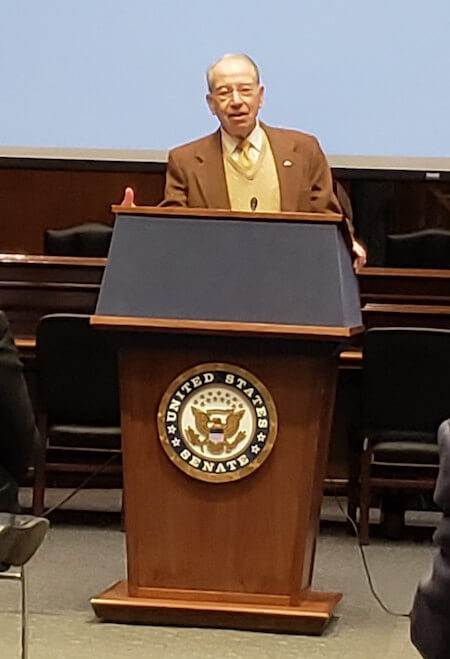
Senator Grassley making welcome remarks.
The NATO Strategic Communications Centre of Excellence (StratCom COE), located in Riga, Latvia, recently sent five of its experts to Washington to present their series of reports on a variety of cybersecurity topics, including robotrolling, social media vulnerabilities, and manipulation of online behavior. Senator Chuck Grassley (RIA), co-chair of the Senate Baltic Freedom Caucus, made welcome remarks and offered his support to the Centre’s work. The team of briefers did an outstanding job of relating technical-level analysis to the average person’s everyday experience on the internet.
The briefings took place in the Dirksen Senate Office building to an audience of over 160 Congressional staffers, diplomats from numerous embassies and international military staffs, and representatives from the Departments of State and Defense, think tanks, non-profits, academia, and other interested parties. The event was co-hosted and organized by the Senate Baltic Freedom Caucus and the Embassy of Latvia.
Senator Grassley stressed the importance of the reports’ findings and drew parallels among the initial Soviet takeover of the Baltic nations, their fight for freedom in 1991, and the challenges the West is facing today. He noted that KGB-style actors have changed their names and updated their tactics, and that Estonia, Latvia and Lithuania offer a valuable source of insight to countering them, stating, “I’m interested in how the U.S. can benefit from our Baltic allies.”
The authors of the reports sought to address ongoing hostile influence campaigns in Europe and the United States that have increasingly targeted the digital landscape. They called out the Kremlin’s interference in presidential elections in the United States and France as an example of how large-scale foreign influence campaigns can exploit the online environment. Their studies focused on several main areas:
• The black market of social media manipulation
• How automated accounts are used to distract conversations on social media
• How digital advertising and algorithms influence our preferences, the content we see, and the decisions we make
• How these features can be used to influence public opinion
Recommendations for addressing these very real vulnerabilities are rooted in transparency and educating the users of social media to dis cern real news from fake manipulations. Governments need to better understand the problem and change the rules to limit the currently permissive environment that allows malign actors to operate, and create incentives to encourage defensibility of the online marketplace. Finally, oversight needs to break the cycle of responding to what happened yesterday. Open dialog among like-minded societies to get ahead of malicious tactics and develop deterrents and mechanisms for counterattack is critical to ending the free rein state and non-state actors presently enjoy.
These reports and other StratCom COE publications are available at www.stratcomcoe.org. The organization is one of 25 NATO-accredited Centres of Excellence covering a range of topic areas important to international military cooperation. Tallinn hosts the NATO COE for Cooperative Cyber Defence and the NATO COE for Energy Security is located in Vilnius. More information on all the NATO COEs can be found at www.nato.int under the Topics tab, then using the alphabetical index to find Centres of Excellence.
Karin Shuey
Washington, DC
Director Estonian American National Council














